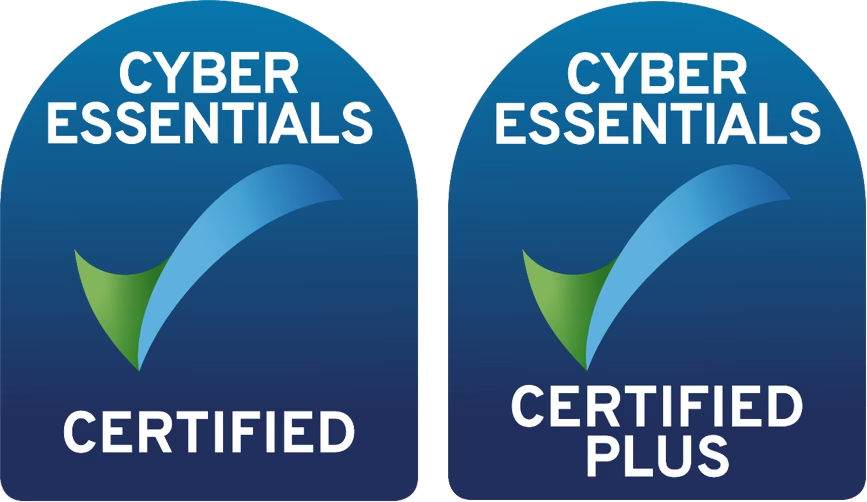Why Mobile Devices Are Now a Top Cybersecurity Concern
In 2025 most of us are used to hybrid working, and you may or may not use your mobile device for business purposes. However, are you aware that your smartphone is more than just a communication tool?
It is a prime target for cyber criminals, hackers, and a gateway to your business data, client communications, and sensitive company systems. With fully managed IT Support which includes Mobile device management and MDR protection, you can ensure that your mobile devices are protected against these threats.
Without proper mobile MDR protection, this can lead to serious consequences.
- Stolen confidential business data
- Direct access to corporate emails and cloud platforms
- Easy access for deployment of malware or spyware
- Tracking of your personal location & movements
- Use your device as a launchpad for wider attacks
- With the rise of BYOD (Bring Your Own Device) policies, the risks are even greater.
- Cybercriminals are increasingly targeting mobile endpoints because
- Mobile devices are often less protected than desktops or laptops.
- Public Wi-Fi and unsecured apps create easy entry points.
- Lost or stolen phones can expose unencrypted data.
- Phishing via SMS (smishing) is on the rise and harder to detect.
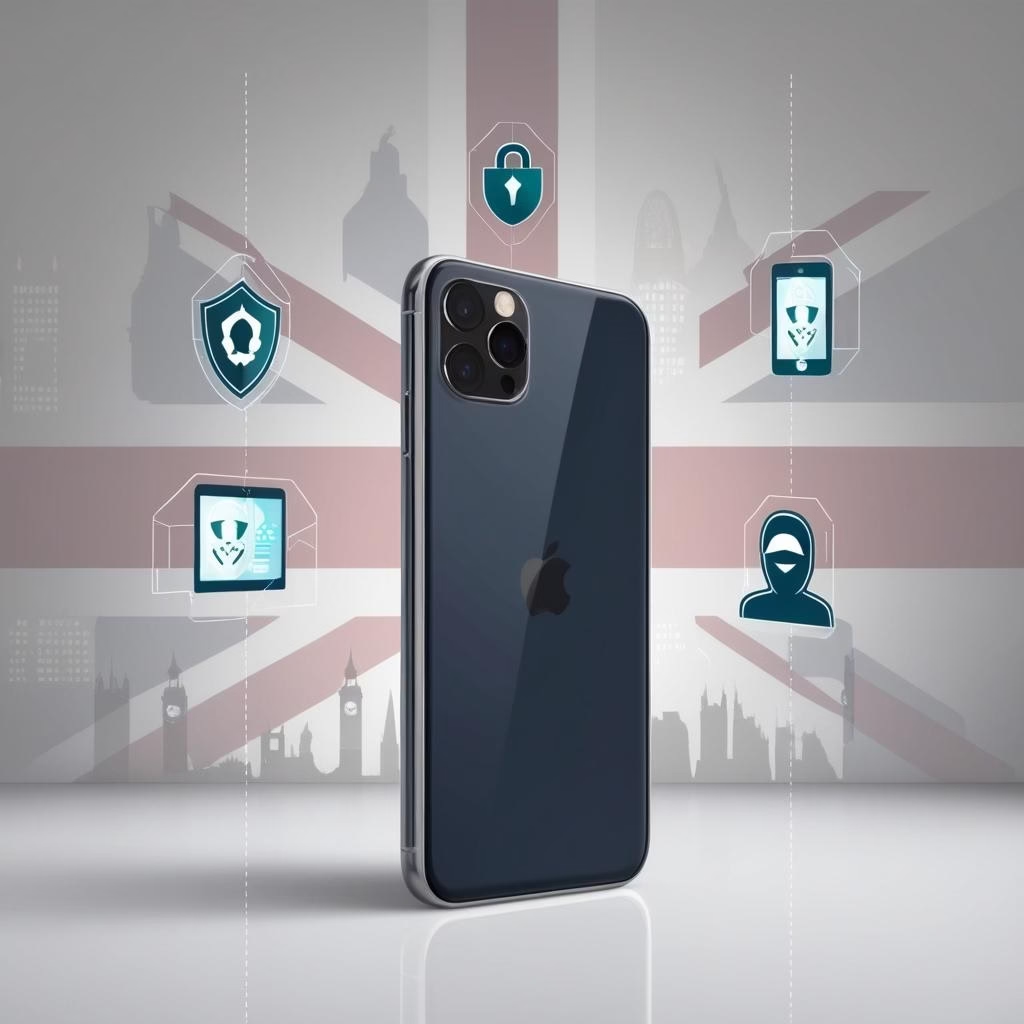
How to Strengthen Mobile Security in 2025
Here’s what UK businesses should implement today:
- Mobile Device Management (MDM): Enforce encryption, remote wipe, and app control policies.
- Mobile MDR: Add a layer of intelligent threat detection and response.
- Zero Trust Access: Verify every user and device before granting access.
- Regular Security Training: Educate staff on phishing, smishing, and app hygiene.
- Patch Management: Keep mobile OS and apps up to date with the latest security fixes.
- Network Segmentation: Isolate mobile traffic from critical systems.
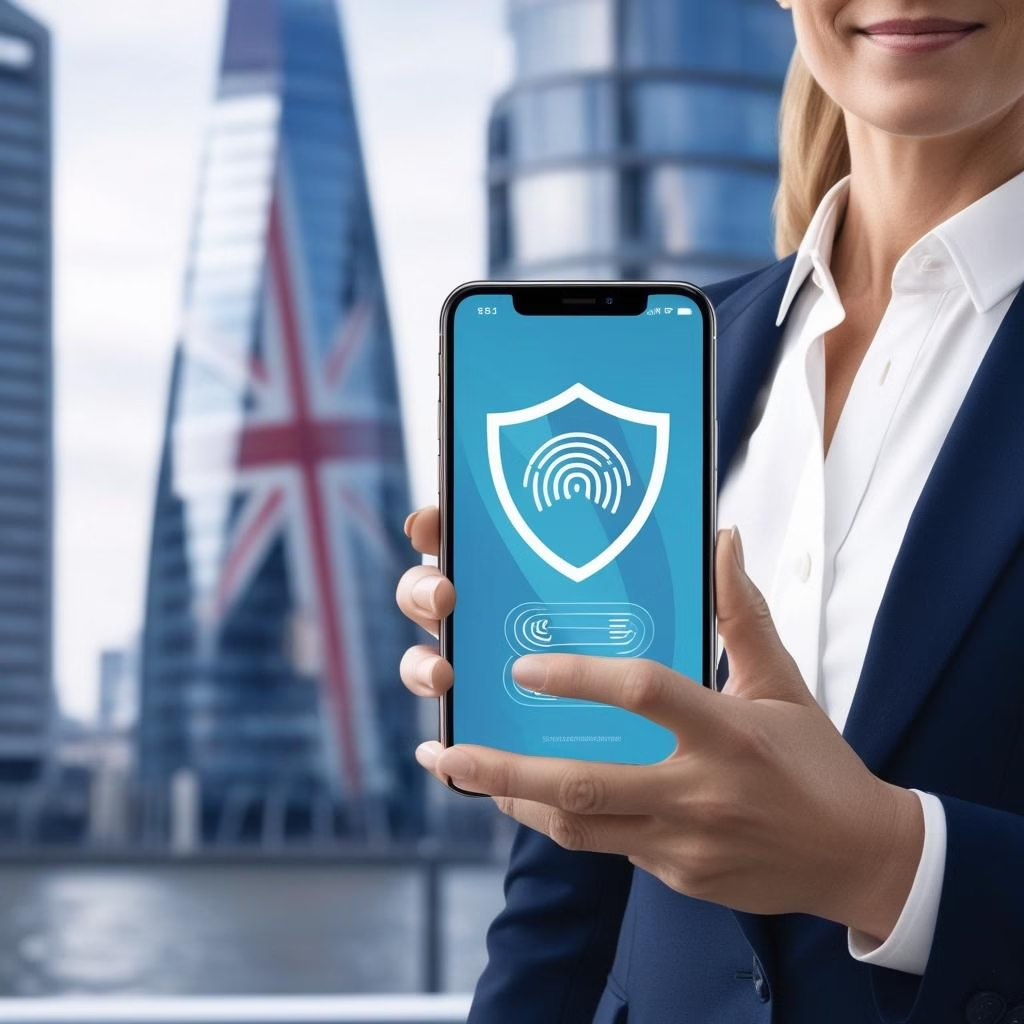
What exactly is Mobile MDR and how is it different from traditional MDM (Mobile Device Management)
Mobile Device Management (MDM) is great for enforcing policies. Like requiring passwords, enabling encryption, or remotely wiping a lost phone. But it doesn’t actively monitor for threats or respond to attacks.
That’s where Mobile MDR steps in:
Mobile Managed Detection and Response (MDR) is a proactive cybersecurity solution that continuously monitors mobile devices for threats, detects suspicious behaviour, and responds in real time.
Key Benefits of Mobile MDR
If your staff are using personal or company-provided mobiles for corporate access, it’s time to reconsider.
Mobile devices are used across home, office, and public networks, making them vulnerable to various threats. Mobile MDR offers proactive protection that MDM alone cannot provide.
This is especially valuable for:
- Regulated industries (finance, legal, healthcare)
- BYOD (bring your own device) environments
- Remote-first teams
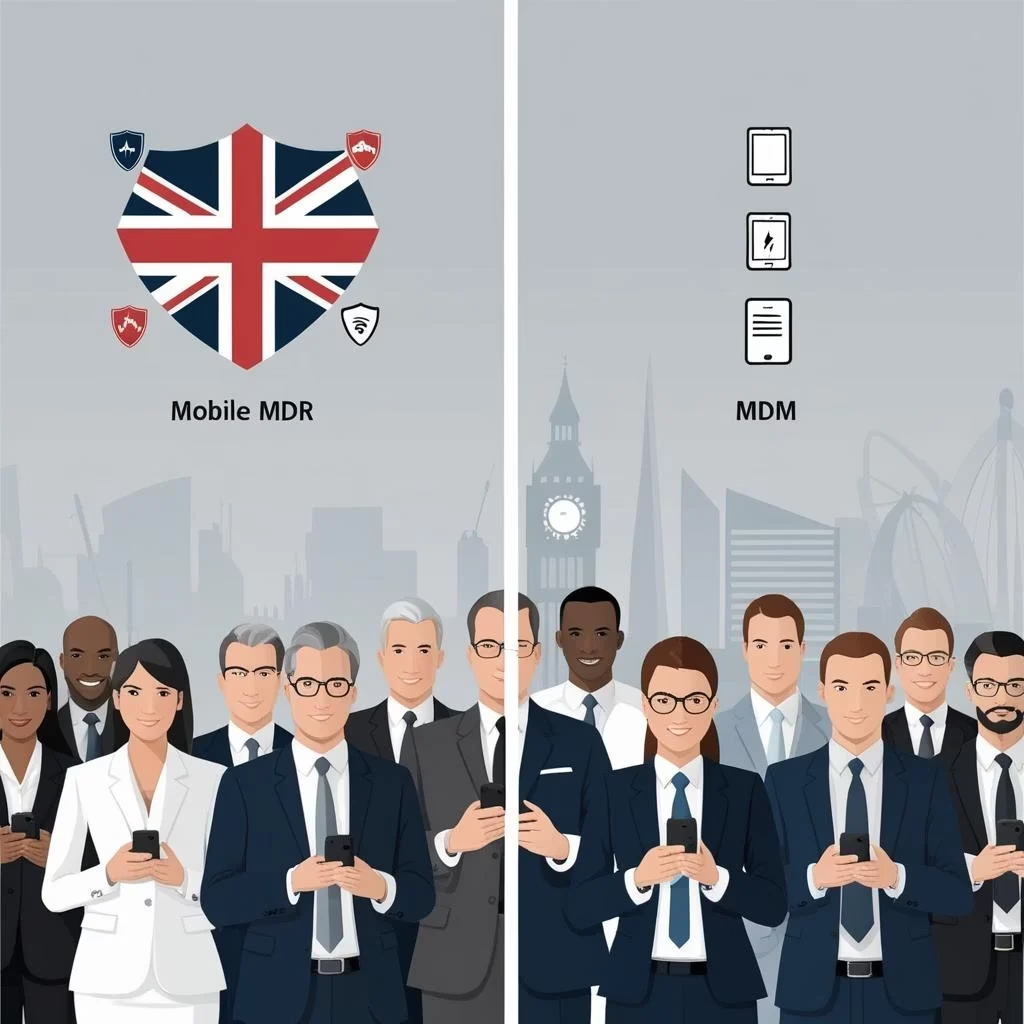
Mobile MDR Real Time Threat Detection
Constant 24/7 Mobile Monitoring
Mobile MDR continuously scans mobile devices for suspicious activity — such as unusual app behaviour, unauthorised access attempts, or data exfiltration. 24/7 threat monitoring for mobile endpoints ensures that any suspicious activity is detected promptly.
Behavioural Analysis
Mobile MDR uses AI and machine learning to detect anomalies that might indicate a compromise, even if traditional antivirus tools miss them. AI-driven threat intelligence to detect zero-day exploits enhances the system’s ability to identify and respond to new and emerging threats.
Phishing & Smishing Protection
Detects malicious links in emails, texts, and apps, a growing threat in hybrid work environments. This includes popular communication apps like WhatsApp, Telegram, and other messaging platforms that may run side by side with your business mobile stack apps.
Mobile MDR Automated Response
Instant Isolation: If a device is compromised, Mobile MDR can automatically isolate it from the network to prevent lateral movement. Device isolation to prevent lateral movement across your network is a critical feature to contain threats and protect other devices.
Mobile MDR Remote Remediation
Mobile MDR can trigger actions like uninstalling malicious apps, revoking access tokens, or enforcing new security policies, all without user intervention. Real-time alerts and automated response to attacks ensure that threats are addressed immediately.
Threat Intelligence Integration
Mobile MDR solutions are often connected to global threat databases, allowing them to respond to emerging threats in real time. Seamless integration with your existing MDM or EDR platforms ensures that the Mobile MDR system works smoothly with your current security infrastructure.
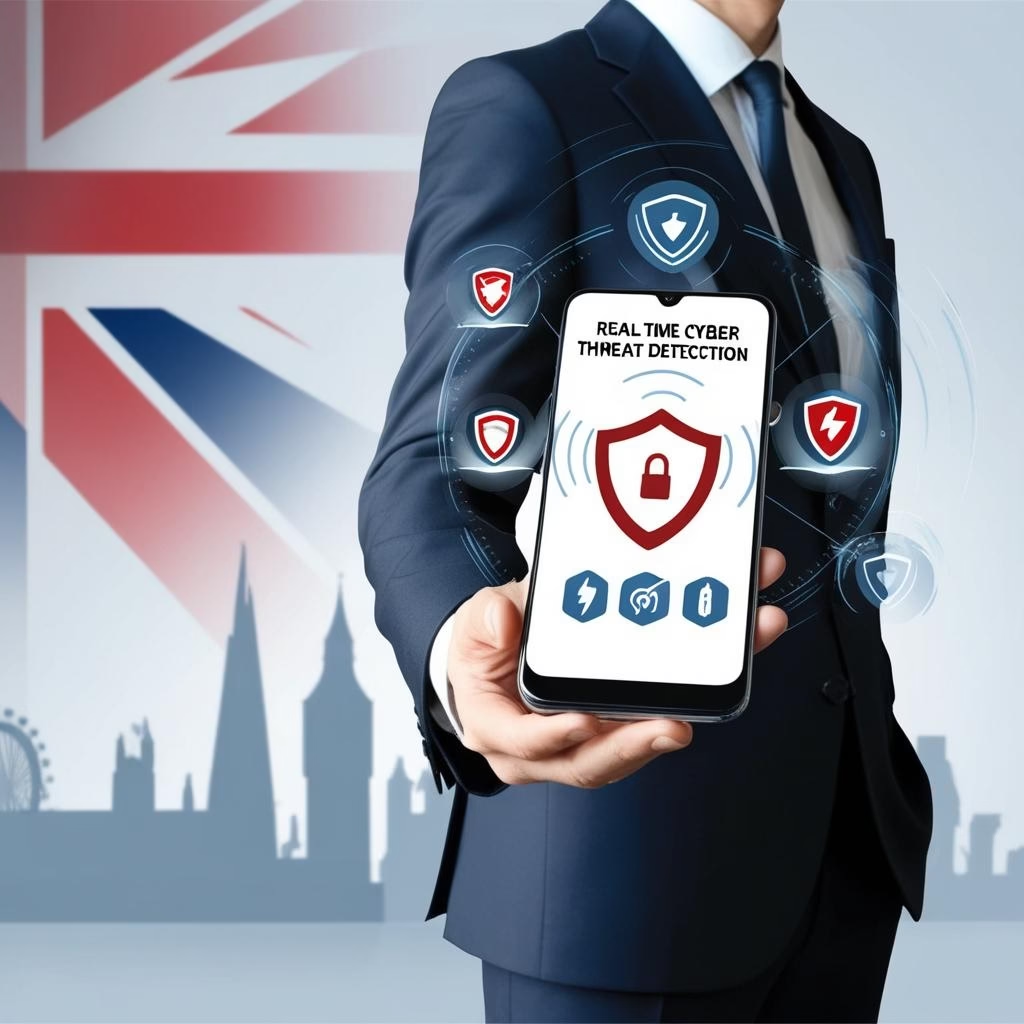
How Speedster IT Can Help
At Speedster IT, we offer tailored mobile security solutions for UK businesses, using only the best, WatchGuard.
What Are the Legal and Compliance Implications of Mobile Security in Hybrid Work?
In the UK, businesses operating in a hybrid work model must ensure that mobile security practices comply with the UK GDPR and the Data Protection Act 2018. These laws require organisations to implement appropriate technical and organisational measures to protect personal and sensitive data, including data accessed or stored on mobile devices.
Why Mobile Security Matters Under UK GDPR
Under the UK GDPR, businesses must:
- Ensure data confidentiality, integrity, and availability, even when accessed via mobile devices.
- Prevent unauthorised access or loss of personal data, which includes data accessed through smartphones, tablets, or BYOD devices.
- Demonstrate accountability meaning you must be able to show regulators that you’ve taken reasonable steps to secure mobile endpoints.
Failure to do so could result in fines of up to £17.5 million or 4% of annual global turnover, whichever is higher.
How WatchGuard Mobile MDR Helps You Stay Compliant
At Speedster IT, we deploy WatchGuard Mobile MDR to help UK businesses meet these legal obligations by:
- Providing 24/7 monitoring of mobile devices for threats and anomalies
- Automatically responding to incidents (e.g. isolating compromised devices)
- Logging and reporting all activity for audit and compliance purposes
- Supporting BYOD policies with granular control and visibility
- Integrating with MDM and cloud platforms to enforce consistent security policies
This proactive approach not only reduces your risk of a data breach but also strengthens your compliance posture, especially in regulated sectors like finance, legal, and healthcare.
Industry-Specific Considerations
If your business operates in a regulated industry, you may also be subject to:
- FCA regulations (for financial services)
- NHS DSP Toolkit (for healthcare providers)
- ISO 27001 (for information security management)
WatchGuard Mobile MDR supports these frameworks by offering real-time threat intelligence, incident response, and compliance ready reporting.
Mobile security is no longer optional — it’s a legal requirement. With hybrid working here to stay, UK businesses must ensure that mobile endpoints are protected to avoid regulatory penalties and reputational damage.
Speedster IT can help you implement a compliant, scalable mobile security strategy using WatchGuard Mobile MDR.
Whether you’re a London-based SME or a national enterprise, we’ll help you secure your mobile workforce without compromising productivity.
Ready to Secure Your Mobile Devices?
Don’t wait for a breach to take action. Contact Speedster IT today to assess your mobile security posture and implement the right protection for your business.
Get in touch with us 0204 511 9111

With over 15 years at Speedster IT, I’ve built a career around helping businesses navigate the evolving world of technology. I publish all the content for the IT Support London Blog and Cyber Security Blog, where I share practical insights on infrastructure upgrades, cybersecurity trends, and smart IT strategies for growing companies.
